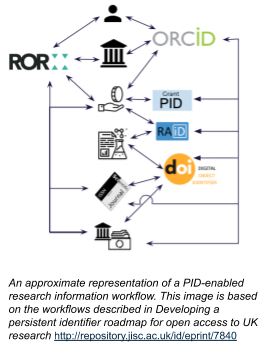This is a guest blog post written by Dr Fiona Murphy, MMC Consulting, https://orcid.org/0000-0003-1693-1240 and Dr Phill Jones, Double L Digital Consulting https://orcid.org/0000-0003-0525-6323.
Reference back to these posts about the wider project:
https://orcid.org/blog/2020/08/03/orcid-and-uk-national-pid-consortium

In the fourth of this series of reports from the Jisc persistent identifier (PID) focus group meetings, we will outline some of the group’s key findings as they explored how identifiers for people could be integrated further into the research ecosystem.
This focus group was made up of representatives from infrastructure providers, publishers, and university librarians.
Context
The Open Researcher and Contributor Identifier (ORCID), has emerged as the de facto standard person identifier for those currently active in the research space, as demonstrated in studies by OCLC/euroCRIS and the Freya project. ORCID is designed to be integrated into active research workflows. The ORCID identifier (iD) and associated metadata are owned and controlled by the researcher, who can update their own record and/or delegate permission to organisations and systems to do so. In 2015, a national consortium, supported by Jisc, was launched in the UK. At the time of writing it has 98 members, of which 80% have some kind of live ORCID integration in at least one institutional system.
Carpe Diem
It was pointed out that it is important to get questions of persistent identifiers into high-level national strategic discussions. Now is a good time to be having these conversations as the UK government’s research and innovation roadmap was recently released for consultation.
During the focus group, we discussed what has made ORCID so successful. Many people felt that its transparent governance structure — including having a broad selection of stakeholders, the majority of which are not-for-profit organisations — is key. This is not to say that ORCID has entirely solved the problem. Not all ORCID members currently make use of the API and are, therefore, not getting full value from their membership, so more work needs to be done to ensure ORCID is seen as important enough to be prioritised and/or for the integration process to be simplified. In addition, uptake is uneven across the academy — for example, the humanities and social sciences are making far less use of ORCID than the life sciences. The group therefore felt that more extensive use of ORCID functionality should be made throughout the research ecosystem to truly benefit open science.

Levelling the adoption playing field
ORCID is comparatively well-established, so much of the discussion focused on how to capitalise on this to accelerate the acceptance, awareness, and adoption of other persistent identifiers. Having said this, the group also discussed how best to build on knowledge and best practices around ORCID itself. Perhaps specific work around Plan S, the Open Research Funders Group, SPARC, and RORI would be helpful to support its adoption?
With respect to take-up and more innovative usage of ORCID, the group agreed that a certain amount of ‘the community will decide’ is required, which necessitates building a clear understanding of who the ‘community’ is and what the community thinks.
The group also noted that adoption can be slower in institutions where those in charge of the institutional infrastructure systems, the CRIS/RIM, or the repositories have insufficient bandwidth, technical resources, or training to be able to make the best use of these systems. Addressing these issues directly may help.
Moving forward
The group suggested that ORCID’s value propositions could be updated to take into account institutions’ own priorities, including their ranking concerns, understanding of their own value, taking ownership of the emerging impact narrative agendas, which would eventually enable them to become more proactive in how ranking itself is conducted.
Where organisations or disciplines are not receiving a ‘return’ on their investment in ORCID, we should explore what models, both in the UK and internationally, could be adopted to meet their needs. We should also draw on the experiences of those communities that are getting significant benefit from their use of ORCID, to identify opportunities to transplant or adapt their strengths to others. Where there are existing initiatives to extend or realise these benefits we should support them, including promoting the techniques or approaches that they have used.
